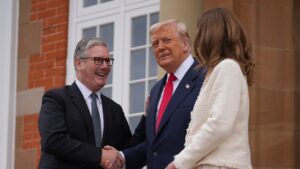The mayor of Louisville, Kentucky, notified the Department of Justice (DOJ) on Monday about changing the city’s policy on federal immigration detainers after being warned of a possible lawsuit.
Mayor Craig Greenberg, a Democrat, stated in a letter obtained by Fox News Digital that the policy adjustment was made to avoid being labeled as a “sanctuary” city, a term used for jurisdictions with policies conflicting with federal immigration enforcement.
“My understanding is that, by reverting to our pre-2017 practices and honoring 48-hour detainers, Louisville will no longer be considered a sanctuary jurisdiction and will no longer face negative consequences from this designation,” Greenberg wrote to Assistant Attorney General Brett Shumate. “The city will adjust its detainer policy to prevent litigation over DOJ’s claims of federal preemption.”
The mayor’s decision followed a warning from the DOJ last month stating that Louisville’s detainer policy obstructed the Trump administration’s efforts to address immigration issues in the city. Non-compliant states and cities have faced legal actions and federal funding freezes, according to the DOJ.
Detainer policies are a common reason for cities to be classified as sanctuaries for illegal immigrants. Immigration and Customs Enforcement (ICE) uses detainer forms to inform jails about possible illegal immigrants in local custody that ICE intends to detain. Sanctuary jurisdictions typically ignore these notices.
Previously, the Louisville Metro Department of Corrections did not honor the 48-hour period ICE requested to hold suspects, resulting in their release from custody before ICE could apprehend them.
Attorney General Pam Bondi mentioned that Louisville was dropping its sanctuary city policies without providing specific details. She emphasized the importance of cities following the law, eliminating sanctuary policies, and collaborating with authorities to address the illegal immigration crisis.
The DOJ has initiated immigration-related lawsuits in various locations, including New York, Chicago, and Colorado, although judicial opinions on the government’s arguments are pending.





